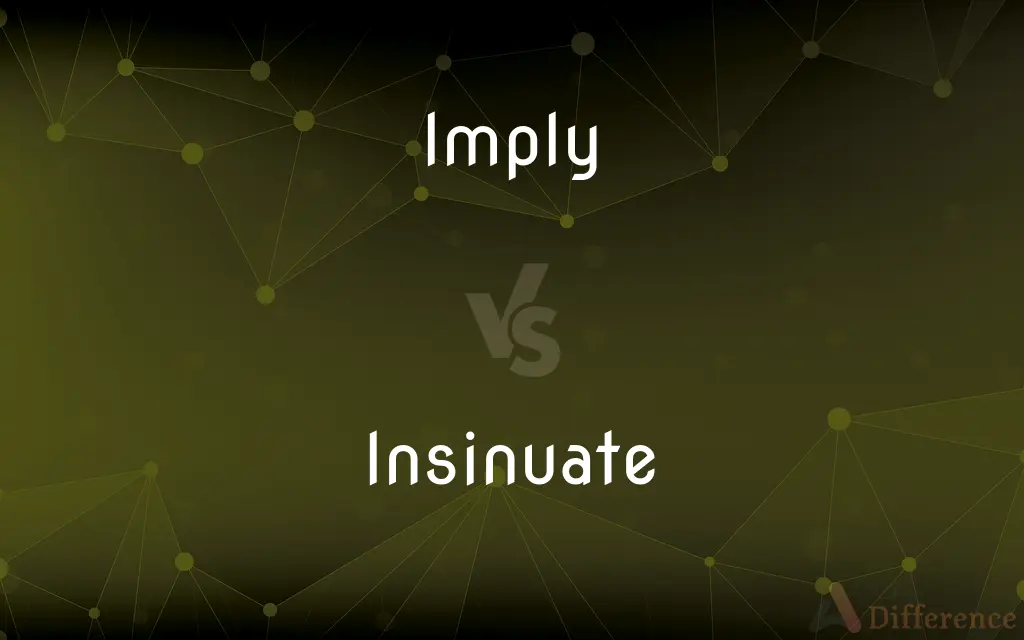Imply vs. Insinuate — What's the Difference?
Edited by Tayyaba Rehman — By Fiza Rafique — Updated on October 25, 2023
"Imply" means to suggest something indirectly, while "insinuate" often means to hint at something, usually with a negative or malicious undertone.

Difference Between Imply and Insinuate
Table of Contents
ADVERTISEMENT
Key Differences
To "imply" is to suggest or convey an idea without stating it directly. The speaker leaves it to the listener to infer the underlying message. Conversely, to "insinuate" is to hint or suggest something, often in a sly, secretive, or negative manner, leading the listener to suspect or deduce the intention.
While both words deal with indirect suggestions, "imply" is neutral and can be used in any context. "Insinuate," however, often has a more negative connotation, indicating a secretive, undermining, or sometimes accusatory tone.
When someone implies, they put the onus on the listener to understand the underlying message. On the other hand, insinuation is a more active effort by the speaker to plant an idea in the listener's mind, sometimes causing doubt or suspicion.
"Imply" comes from the Latin word "implēre," meaning "to enfold" or "entangle." It denotes the action of enveloping a meaning within words. "Insinuate," derived from Latin "insinuāre," means "to wind" or "curve into," highlighting the sneaky or winding way a message is introduced.
While "imply" is commonly used in various contexts, from casual to formal, "insinuate" is often reserved for situations where there's an element of subterfuge or where one is casting aspersions, making it less universal in its application.
ADVERTISEMENT
Comparison Chart
Definition
To suggest indirectly
To hint, usually with a negative or malicious undertone
Connotation
Neutral
Often negative
Dependence
Puts onus on the listener to infer
Actively plants an idea
Etymology
From Latin "implēre" meaning "to enfold"
From Latin "insinuāre" meaning "to wind" or "curve into"
Common Usage
Broadly used in various contexts
More specific, often indicating doubt or suspicion
Compare with Definitions
Imply
To have as a suggestion or underlying hint.
The data implies a rise in employment rates.
Insinuate
To suggest or hint slyly.
He insinuated that not all participants were honest.
Imply
To convey or throw in as an insinuation or assertion.
Did you imply that I was lying?
Insinuate
To introduce or insert with discretion.
She insinuated her viewpoint into the conversation.
Imply
To express indirectly.
The article implied a certain bias against the policy.
Insinuate
To express or otherwise convey (a thought, for example) in an indirect or insidious way.
Imply
To involve as a logical or necessary outcome.
His statement implies that he was at the scene.
Insinuate
To maneuver or insert (oneself) into a place
"One of the boys insinuated himself next to me and squeezed my hand" (Caroline Preston).
Imply
To express or state indirectly
She implied that she was in a hurry.
Insinuate
To cause (oneself) to be involved or accepted by subtle and artful means
Insinuated himself into court intrigues.
Insinuated herself into my good graces.
Imply
To make evident indirectly
His fine clothes implied that he was wealthy. See Usage Note at infer.
Insinuate
To make insinuations.
Imply
To involve by logical necessity; entail
Life implies growth and death.
Insinuate
To hint; to suggest tacitly (usually something bad) while avoiding a direct statement.
She insinuated that her friends had betrayed her.
Imply
To have as a necessary consequence
The proposition that "all dogs are mammals" implies that my dog is a mammal.
Insinuate
(rare) To creep, wind, or flow into; to enter gently, slowly, or imperceptibly, as into crevices.
Imply
To suggest by logical inference
When I state that your dog is brown, I am not implying that all dogs are brown.
Insinuate
To ingratiate; to obtain access to or introduce something by subtle, cunning or artful means.
Imply
To hint; to insinuate; to suggest tacitly and avoid a direct statement
What do you mean "we need to be more careful with hygiene"? Are you implying that I don't wash my hands?
Insinuate
To introduce gently or slowly, as by a winding or narrow passage, or a gentle, persistent movement.
The water easily insinuates itself into, and placidly distends, the vessels of vegetables.
Imply
(archaic) to enfold, entangle.
Insinuate
To introduce artfully; to infuse gently; to instill.
All the art of rhetoric, besides order and clearness, are for nothing else but to insinuate wrong ideas, move the passions, and thereby mislead the judgment.
Horace laughs to shame all follies and insinuates virtue, rather by familiar examples than by the severity of precepts.
Imply
To infold or involve; to wrap up.
Insinuate
To hint; to suggest by remote allusion; - often used derogatorily; as, did you mean to insinuate anything?
Imply
To involve in substance or essence, or by fair inference, or by construction of law, when not include virtually; as, war implies fighting.
Where a malicious act is proved, a malicious intention is implied.
When a man employs a laborer to work for him, . . . the act of hiring implies an obligation and a promise that he shall pay him a reasonable reward for his services.
Insinuate
To push or work (one's self), as into favor; to introduce by slow, gentle, or artful means; to ingratiate; - used reflexively.
He insinuated himself into the very good grace of the Duke of Buckingham.
Imply
To refer, ascribe, or attribute.
Whence might this distaste arise?
If [from] neither your perverse and peevish will.To which I most imply it.
Insinuate
To creep, wind, or flow in; to enter gently, slowly, or imperceptibly, as into crevices.
Imply
Express or state indirectly
Insinuate
To ingratiate one's self; to obtain access or favor by flattery or cunning.
He would insinuate with thee but to make thee sigh.
To insinuate, flatter, bow, and bend my limbs.
Imply
Suggest as a logically necessary consequence; in logic
Insinuate
Introduce or insert (oneself) in a subtle manner;
He insinuated himself into the conversation of the people at the nearby table
Imply
Have as a logical consequence;
The water shortage means that we have to stop taking long showers
Insinuate
Give to understand;
I insinuated that I did not like his wife
Imply
Suggest that someone is guilty
Insinuate
To instill or infuse subtly or artfully.
The rumors insinuated doubt among the team.
Imply
Have as a necessary feature or consequence; entail;
This decision involves many changes
Insinuate
To imply, especially something derogatory.
Are you insinuating that I stole the idea?
Imply
To indicate or suggest without explicitly stating.
Her silence seemed to imply agreement.
Insinuate
To artfully and often subtly make a point.
The poem insinuates themes of loss and renewal.
Common Curiosities
Is "insinuate" always negative?
Often, but not always. The context determines its tone.
Can a gesture "imply" something?
Yes, gestures or actions can imply meanings as much as words can.
Can "imply" and "insinuate" be used interchangeably?
Not always. While both deal with indirect suggestions, "insinuate" often has a negative connotation.
Who does the action in "imply"?
The speaker implies, and the listener infers.
Can facts imply?
Yes, facts can imply conclusions or further information.
Why might someone choose to insinuate rather than state directly?
To subtly plant an idea, often causing doubt or suspicion, without direct accusation.
Can insinuations be positive?
While less common, insinuations can be positive, depending on context.
Why might someone use "imply" in communication?
To convey a message without stating it directly, allowing the listener to infer.
Is "insinuate" always about people?
No, it can be about any subject, though it often involves personal implications.
How can I respond to an insinuation?
By seeking clarification, ignoring it, or addressing it directly, depending on the situation.
How do I know if someone is implying or insinuating something?
Context, tone, and the nature of the information can provide clues.
Share Your Discovery

Previous Comparison
Onto vs. Unto
Next Comparison
Master vs. CaptainAuthor Spotlight
Written by
Fiza RafiqueFiza Rafique is a skilled content writer at AskDifference.com, where she meticulously refines and enhances written pieces. Drawing from her vast editorial expertise, Fiza ensures clarity, accuracy, and precision in every article. Passionate about language, she continually seeks to elevate the quality of content for readers worldwide.
Edited by
Tayyaba RehmanTayyaba Rehman is a distinguished writer, currently serving as a primary contributor to askdifference.com. As a researcher in semantics and etymology, Tayyaba's passion for the complexity of languages and their distinctions has found a perfect home on the platform. Tayyaba delves into the intricacies of language, distinguishing between commonly confused words and phrases, thereby providing clarity for readers worldwide.














































